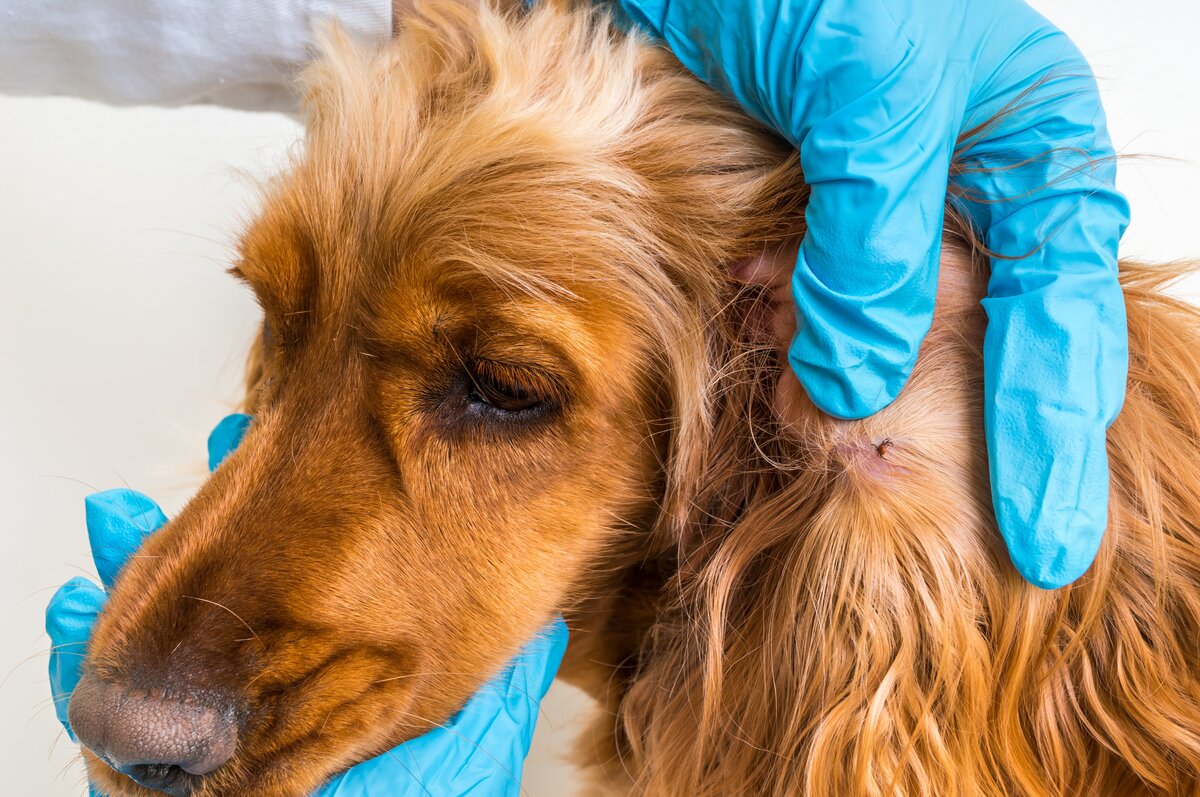Home>Health & Wellness>Common Health Issues>What Is The Best Tick Prevention Medicine For Dogs


Common Health Issues
What Is The Best Tick Prevention Medicine For Dogs
Published: February 5, 2024
Learn about common health issues in dogs and find out the best tick prevention medicine to keep your furry friend healthy and happy. Discover effective ways to protect your dog from ticks and ensure their well-being.
(Many of the links in this article redirect to a specific reviewed product. Your purchase of these products through affiliate links helps to generate commission for Pawsomeoldies.com, at no extra cost. Learn more)
Table of Contents
Introduction
Tick prevention is a crucial aspect of maintaining the health and well-being of our beloved canine companions. As responsible pet owners, it is our duty to safeguard our furry friends from the potential harm posed by these tiny yet dangerous parasites. Ticks are not only a nuisance but also carriers of various diseases that can severely impact a dog's health. Therefore, understanding the significance of tick prevention and choosing the most effective tick prevention medicine for dogs is paramount.
Ticks are notorious for latching onto dogs during outdoor activities, such as walks in the park or hiking adventures. These blood-sucking parasites can transmit a range of illnesses, including Lyme disease, ehrlichiosis, anaplasmosis, and Rocky Mountain spotted fever. The consequences of these diseases can be debilitating for dogs, leading to symptoms such as fever, lethargy, joint pain, and in severe cases, organ damage. Hence, preventing tick infestations is not just about keeping our furry companions comfortable; it is a matter of safeguarding their overall health and longevity.
In this comprehensive guide, we will delve into the essential factors to consider when selecting tick prevention medicine for dogs. By understanding these key considerations, pet owners can make informed decisions to protect their canine companions from the perils of tick-borne diseases. Additionally, we will compare different types of tick prevention medicines available for dogs, providing insights into their mechanisms of action and effectiveness. Furthermore, we will highlight some of the top recommended tick prevention medicines for dogs, offering valuable recommendations based on efficacy and safety.
By the end of this guide, pet owners will be equipped with the knowledge and understanding necessary to make the best choice for their furry friends' tick prevention needs. Let's embark on this journey to ensure the well-being and vitality of our canine companions by making informed decisions regarding tick prevention medicine.
Understanding the importance of tick prevention for dogs
Tick prevention for dogs is not merely a matter of convenience; it is a critical component of responsible pet care. Ticks are more than just pesky parasites; they pose a significant threat to the health and well-being of our canine companions. These blood-feeding arachnids are capable of transmitting a variety of diseases, making tick prevention a matter of paramount importance for dog owners.
One of the most concerning aspects of tick infestations is the potential transmission of tick-borne diseases. These illnesses can have severe repercussions on a dog's health, ranging from mild discomfort to life-threatening conditions. Lyme disease, for instance, is a well-known tick-borne illness that can cause symptoms such as fever, lameness, and swollen joints. Additionally, ehrlichiosis and anaplasmosis are other common tick-borne diseases that can lead to an array of health issues, including anemia and organ damage.
Furthermore, the impact of tick-borne diseases extends beyond physical health, affecting a dog's overall well-being and quality of life. The discomfort and distress caused by these illnesses can diminish a dog's vitality and joy, hindering their ability to engage in daily activities and enjoy their usual routines. As devoted pet owners, it is our responsibility to protect our furry friends from these potential threats and ensure that they lead healthy, fulfilling lives.
In addition to the direct health risks posed by tick-borne diseases, tick infestations can also result in secondary complications. When ticks attach themselves to a dog's skin and feed on their blood, they can cause irritation, inflammation, and in some cases, allergic reactions. Moreover, excessive scratching or biting at the site of tick attachment can lead to skin infections, further compromising a dog's well-being.
Beyond the physical implications, tick infestations can also have financial implications for pet owners. The treatment of tick-borne diseases and their associated complications can incur substantial veterinary costs, adding to the burden of managing a dog's health.
By understanding the gravity of these potential consequences, pet owners can appreciate the significance of proactive tick prevention. Implementing effective tick prevention measures not only safeguards a dog's health but also contributes to their overall happiness and longevity. It is a proactive investment in a dog's well-being, ensuring that they can thrive without the burden of tick-related health issues.
In the subsequent sections, we will explore the key factors to consider when selecting tick prevention medicine for dogs, empowering pet owners to make informed decisions and provide the best protection for their beloved canine companions.
Top factors to consider when choosing tick prevention medicine for dogs
When it comes to choosing tick prevention medicine for dogs, several crucial factors should be taken into account to ensure the most effective protection for our furry companions. Understanding these key considerations can empower pet owners to make informed decisions and select the most suitable tick prevention medicine tailored to their dog's specific needs.
-
Effectiveness: The primary consideration when choosing tick prevention medicine is its effectiveness in repelling and killing ticks. Look for products that not only prevent tick infestations but also eliminate existing ticks. Understanding the duration of protection offered by the medicine is essential, as it determines how frequently the treatment needs to be administered.
-
Safety: The safety of the tick prevention medicine is paramount. It is crucial to opt for products that are specifically formulated for dogs and have undergone rigorous testing to ensure their safety and efficacy. Consider any potential side effects and interactions with existing medications to safeguard your dog's well-being.
-
Ease of Administration: The convenience of administering the tick prevention medicine is an important factor to consider. Some dogs may be resistant to certain forms of medication, such as topical treatments or oral tablets. Assess your dog's preferences and behavior to choose a form of medicine that can be administered with minimal stress and hassle.
-
Comprehensive Protection: While tick prevention is essential, opting for a product that offers comprehensive protection against a range of parasites, including fleas and mosquitoes, can be advantageous. Multi-purpose tick prevention medicines can provide holistic protection, addressing various potential threats to your dog's well-being.
-
Residual Effects: Understanding the residual effects of the tick prevention medicine is crucial. Some products continue to repel ticks and other parasites even after exposure to water, while others may require reapplication after bathing or swimming. Consider your dog's lifestyle and activity level to select a medicine with suitable residual effects.
-
Veterinarian Recommendations: Seeking guidance from a veterinarian is invaluable when choosing tick prevention medicine for dogs. Veterinarians can offer personalized recommendations based on your dog's health status, age, breed, and any specific environmental factors that may influence the choice of tick prevention medicine.
-
Environmental Considerations: Assessing the environmental factors in your dog's living environment is essential. If your dog frequents areas with high tick populations, such as wooded areas or grassy trails, selecting a potent and reliable tick prevention medicine becomes even more critical.
By carefully evaluating these factors, pet owners can make well-informed decisions when selecting tick prevention medicine for their dogs, ensuring optimal protection against the perils of tick infestations and tick-borne diseases.
Comparison of different types of tick prevention medicine for dogs
When it comes to protecting our canine companions from the dangers of tick infestations, various types of tick prevention medicines are available, each offering unique benefits and modes of action. Understanding the differences between these options is essential for pet owners seeking the most effective protection for their dogs.
Topical Treatments
Topical tick prevention treatments are applied directly to a dog's skin, typically between the shoulder blades or at the base of the neck. These treatments often contain active ingredients that repel and kill ticks upon contact. They are designed to spread across the skin's surface, providing a layer of protection against tick infestations. Topical treatments are convenient to apply and offer residual effects, remaining effective even after exposure to water. However, some dogs may be averse to the sensation of a wet or greasy spot on their skin after application.
Oral Medications
Oral tick prevention medications are administered to dogs in the form of chewable tablets or flavored treats. These medications work systemically, meaning they circulate in the dog's bloodstream, and when ticks feed on the dog's blood, they ingest the active ingredients, which ultimately eliminates the ticks. Oral medications are favored for their ease of administration and the absence of any residue or odor. However, some dogs may be reluctant to consume oral medications, posing a challenge for pet owners.
Collars
Tick prevention collars are designed to be worn around a dog's neck and emit active ingredients that repel ticks and inhibit their ability to attach to the dog's skin. These collars offer long-lasting protection, often ranging from several weeks to several months, making them a convenient option for pet owners. However, it is essential to ensure that the collar fits properly and does not cause discomfort or irritation to the dog. Additionally, some dogs may resist wearing a collar, requiring gradual acclimatization.
Spot-On Treatments
Spot-on tick prevention treatments involve applying a liquid solution directly to a specific area of a dog's skin, typically between the shoulder blades. The active ingredients in the solution spread across the skin, providing protection against ticks. Spot-on treatments are known for their ease of application and residual effects. However, some dogs may exhibit sensitivity to the solution, leading to skin irritation in rare cases.
Injectable Preventatives
Injectable tick prevention products are administered by veterinarians and provide long-lasting protection against ticks. These products are suitable for dogs that may have difficulty with other forms of tick prevention, such as oral medications or topical treatments. However, the need for veterinary administration and potential side effects necessitate careful consideration before opting for injectable preventatives.
By comparing these different types of tick prevention medicines, pet owners can assess the unique advantages and considerations associated with each option, enabling them to make informed decisions based on their dog's preferences, lifestyle, and specific needs.
Read more: How To Prevent Ticks In Dogs
Top recommended tick prevention medicines for dogs
When it comes to safeguarding our canine companions from the perils of tick infestations and tick-borne diseases, several highly effective tick prevention medicines stand out as top recommendations among veterinarians and pet owners. These products have demonstrated exceptional efficacy, safety, and ease of administration, making them reliable choices for ensuring comprehensive tick protection for dogs.
-
Bravecto: Bravecto is a popular oral tick prevention medication that offers long-lasting protection against ticks and fleas. With a single chewable tablet providing up to 12 weeks of defense, Bravecto simplifies the task of tick prevention for pet owners. Its systemic action ensures that ticks are eliminated upon contact, effectively breaking the life cycle of these parasites. Additionally, Bravecto is available in formulations suitable for different dog sizes, catering to the diverse needs of canine companions.
-
Seresto Collar: The Seresto collar has gained widespread acclaim for its extended protection against ticks and fleas. This innovative collar releases active ingredients over an extended period, offering up to 8 months of continuous defense. Its water-resistant properties make it an ideal choice for dogs that are frequently exposed to moisture, ensuring uninterrupted tick prevention. The Seresto collar is designed to provide a comfortable fit and is free from any odor or residue, making it a convenient and reliable option for pet owners.
-
Frontline Plus: Frontline Plus is a trusted topical tick prevention treatment that combines the action of fipronil and (S)-methoprene to target ticks and prevent infestations. This easy-to-apply solution provides rapid and sustained protection, effectively killing ticks and breaking the flea life cycle. Frontline Plus is renowned for its residual effects, remaining active even after exposure to water. Its versatile application makes it suitable for dogs of various sizes and breeds, offering a flexible and potent solution for tick prevention.
-
NexGard: NexGard is a palatable chewable tick prevention medication that has garnered praise for its efficacy and ease of administration. Powered by the active ingredient afoxolaner, NexGard delivers rapid and persistent protection against ticks and fleas. Its beef-flavored formulation makes it appealing to dogs, eliminating the challenge of administering oral medications. With monthly dosing, NexGard ensures consistent tick prevention, providing pet owners with peace of mind regarding their dog's well-being.
-
Advantix II: Advantix II is a comprehensive topical tick prevention and treatment solution that offers a multi-layered defense against ticks, fleas, mosquitoes, and biting flies. Its combination of imidacloprid, permethrin, and pyriproxyfen targets various parasites, providing broad-spectrum protection for dogs. Advantix II's waterproof formula and residual efficacy make it suitable for dogs with active lifestyles, ensuring uninterrupted tick prevention even after exposure to water.
These top recommended tick prevention medicines for dogs have earned the trust of pet owners and veterinarians alike, offering a diverse range of options to suit different preferences and requirements. By selecting one of these highly effective tick prevention medicines, pet owners can proactively safeguard their canine companions from the potential harm posed by ticks, promoting their health, comfort, and vitality.
Conclusion
In conclusion, the well-being of our canine companions is intricately linked to effective tick prevention measures. The significance of protecting dogs from tick infestations and tick-borne diseases cannot be overstated. By understanding the importance of tick prevention and considering the top factors when choosing tick prevention medicine for dogs, pet owners can make informed decisions to ensure the optimal health and longevity of their furry friends.
The comparison of different types of tick prevention medicines has shed light on the diverse options available, each with unique benefits and considerations. From topical treatments to oral medications and collars, pet owners have a range of choices to tailor tick prevention to their dog's specific needs and preferences. Additionally, the top recommended tick prevention medicines, including Bravecto, Seresto Collar, Frontline Plus, NexGard, and Advantix II, have emerged as reliable options, offering exceptional efficacy, safety, and ease of administration.
By prioritizing tick prevention, pet owners not only protect their dogs from the discomfort and health risks associated with tick infestations but also contribute to their overall well-being and quality of life. The proactive approach to tick prevention is an investment in a dog's health, ensuring that they can thrive without the burden of tick-related health issues.
It is essential for pet owners to engage in open communication with their veterinarians to seek personalized recommendations and guidance in selecting the most suitable tick prevention medicine for their dogs. By considering environmental factors, lifestyle, and the specific needs of their canine companions, pet owners can make well-informed decisions that align with their commitment to providing the best care for their beloved pets.
In essence, the journey of selecting tick prevention medicine for dogs is a testament to the unwavering dedication and love that pet owners have for their furry companions. By embracing the responsibility of tick prevention, pet owners play a pivotal role in nurturing the health, happiness, and vitality of their dogs, fostering a bond built on trust, care, and shared moments of joy.













